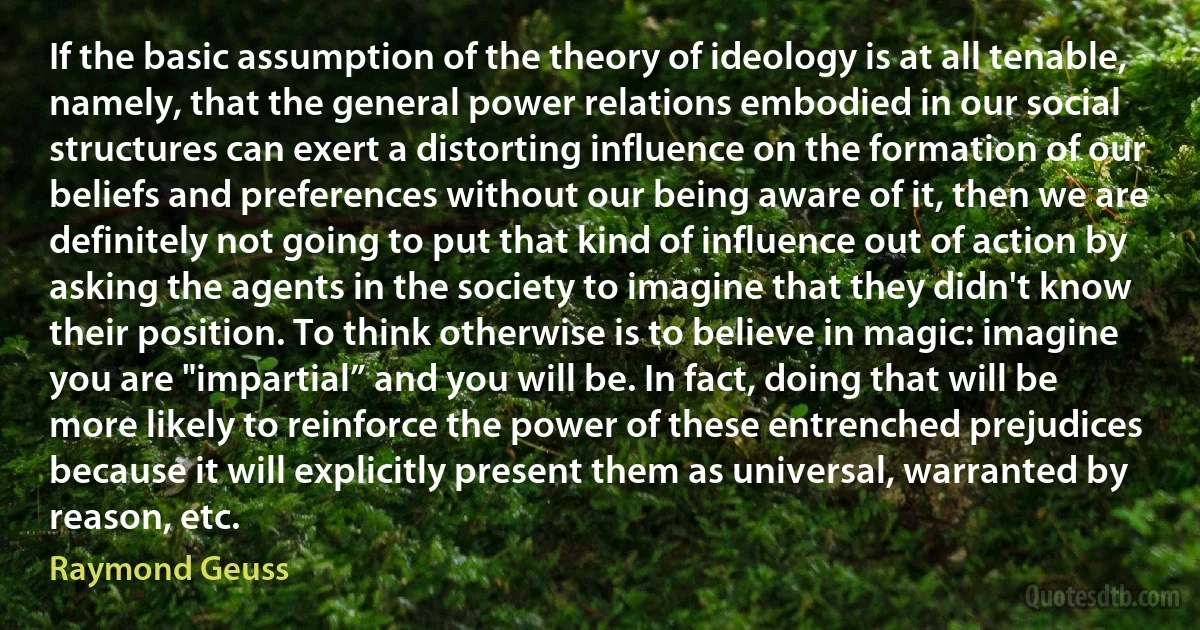
If the basic assumption of the theory of ideology is at all tenable, namely, that the general power relations embodied in our social structures can exert a distorting influence on the formation of our beliefs and preferences without our being aware of it, then we are definitely not going to put that kind of influence out of action by asking the agents in the society to imagine that they didn't know their position. To think otherwise is to believe in magic: imagine you are "impartial” and you will be. In fact, doing that will be more likely to reinforce the power of these entrenched prejudices because it will explicitly present them as universal, warranted by reason, etc.
Raymond GeussRelated topics
action asking assumption basic believe formation general ideology kind likely position power present reason reinforce think universal etc relationsRelated quotes
Let true Christians then, with becoming earnestness, strive in all things to recommend their profession, and to put to silence the vain scoffs of ignorant objectors. Let them boldly assert the cause of Christ in an age when so many, who bear the name of Christians, are ashamed of Him: and let them consider as devolved on Them the important duty of suspending for a while the fall of their country, and, perhaps, of performing a still more extensive service to society at large; not by busy interference in politics, in which it cannot but be confessed there is much uncertainty; but rather by that sure and radical benefit of restoring the influence of Religion, and of raising the standard of morality.

William Wilberforce
God has permitted and does permit us to be shaken by adversity. Difficult times lie ahead. We will be greatly tested. We have to take this warning seriously and live spiritually... Many saints would have loved to have lived in our times and have had our chance to struggle for Christ... Our struggle matters because it is not a struggle against an Ali Pasha, or a Hitler and a Mussolini, but a struggle against the devil himself. For this reason, our wages will be heavenly... The saints will become more holy and the vile will become more vile. Yet I feel great consolation inside. This is only a storm; like past storms, it will pass. May the Good God take evil and turn it into good. Amen.

Paisios of Mount Athos
If supersymmetry plays the role in physics that we suspect it does, then it is very likely to be discovered by the next generation of particle accelerators, either at Fermilab... or at CERN... Discovery of supersymmetry would be one of the real milestones in physics, made even more exciting by its close links to still more ambitious theoretical ideas. Indeed, supersymmetry is one of the basic requirements of "string theory," which is the framework in which theoretical physicists have had some success in unifying gravity with the rest of the elementary particle forces. Discovery of supersymmetry would would certainly give string theory an enormous boost.

Edward Witten
The idea that reason requires an impartial treatment of individuals corresponds to well-known principles. To resolve the questions of distributive justice, Leibniz proposes the following maxim: "Put your self in the place of everyone.” In recent theories, this amounts to saying that the choice of a just organization of society must take place behind a "veil of ignorance,” an idea that can be interpreted in several ways. For utilitarianism, each individual must count as one, and none as more than one. For John Rawls, we have to choose the form of society that favors the least advantaged, whoever they might be. Another impartial idea is that of universal rights, embodied in the two declarations of 1776 and 1789.

Jon Elster
The assumption that the human psyche possesses layers that lie below consciousness is not likely to arouse serious opposition. But... there could just as well be layers lying above consciousness... The conscious mind can only claim a relatively central position and must put up with the fact that the unconscious psyche transcends and as it were surrounds it on all sides. Unconscious contents connect it backward with the physiological states on the one hand and archetypal data on the other. But it is extended forward by intuitions which are conditioned partly by archetypes and partly by subliminal perceptions depending on the relativity of time and space in the unconscious.

Carl Jung
